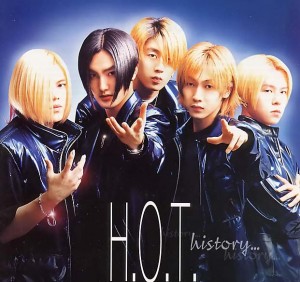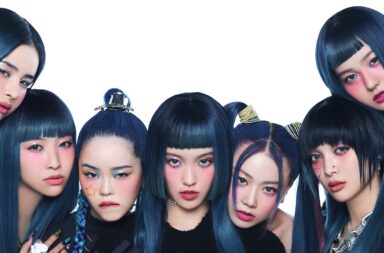 SM is a big part of my K-pop experience: my first ever K-pop song and MV was a SM production (well, at least the MV was), my favourite K-pop group is a SM creation, my bias is signed to SM and I can list every active artist in SM’s roster (well, the idols, anyway). It’s all a bit scary, when I think about it.
SM is a big part of my K-pop experience: my first ever K-pop song and MV was a SM production (well, at least the MV was), my favourite K-pop group is a SM creation, my bias is signed to SM and I can list every active artist in SM’s roster (well, the idols, anyway). It’s all a bit scary, when I think about it.
SM Entertainment was established as a public company in 1995 by Lee Soo-man; while the “SM” initially stood for “Soo-man”, it has since been revised to “Star Museum”, of all things. SM debuted H.O.T in 1996, followed it up with S.E.S in 1997, and has been going strong ever since. Considering that I was only introduced to the company a good decade-and-a-half after its birth, I have some catching up to do. And so, I”ve enlisted Amy, Patricia and Subi to school me in the ways of the Star Museum.
1 .SM was one of the first companies to set up shop, and is still seen to be a leader in present day K-pop. While a lot of it may be due to the funds SME has available compared to other companies, in what other ways have they shaped and influenced K-pop?
 Amy: Lee Soo-man is really the person who started the idol trend, and I think the K-pop landscape today would be really different if not for him. I’m not sure they hold as much influence today in terms of music or style, since K-pop is absorbing such a mish-mash of styles and genres, but what SM did with H.O.T., Shinhwa, and S.E.S. set the stage for all the kiddies to come.
Amy: Lee Soo-man is really the person who started the idol trend, and I think the K-pop landscape today would be really different if not for him. I’m not sure they hold as much influence today in terms of music or style, since K-pop is absorbing such a mish-mash of styles and genres, but what SM did with H.O.T., Shinhwa, and S.E.S. set the stage for all the kiddies to come.
Patricia: One can’t deny that SM’s biggest contribution to the K-pop scene was in its development of some of the biggest idol groups in K-pop history, a legacy that may very well continue in years to come. But more importantly, it can be argued that SM created the idol model from which K-pop draws its basis. While it’s not to say that the idol training system and promotional structure is uniquely SM’s, Lee Soo-man should be duly credited for systemizing these processes and turning them into industry standards. Of course, trends change and aesthetic styles evolve, but there will probably always be something about K-pop that’s slightly formulaic, slightly by-the-book. As one of the biggest pioneers of the K-pop industry as it currently stands, one can argue that SM set forth many important precedents that form the basis of the K-pop system.
Subi: SM has created a brand of entertainment that is easy to make and easy to sell and that is their number one contribution to Korean entertainment. As far as easy to make, Lee Soo Man’s engineered a completely unmediated process when it comes to creating entertainers and entertainment. SM finds artists when they’re young, trains them in multiple aspects of entertainment, hires in-house conceptual designers, musical composers, and everyone else involved in the entertainment making process, and creates everything from the cradle to the grave. The world hasn’t seen such a clean and pristine process since the Golden Age of Hollywood. While this may seem commonplace in K-pop, this process is rooted in SM and as the forebears of the process, they’re the most seasoned and the most successful. They train their artists very carefully (for the most part), study their market back and front, hook them up with some of the best in the industry, and send them on their merry way. And what have been the fruits? Dong Bang Shin Ki, Super Junior, So Nyeo Shi Dae, and SHINee. Some. Of. The. Biggest. Names. In. The. Industry.
2a) As much as we complain about SM and everything in does wrong, it seems that in the end we always come back for more. I can’t really put a finger on why, though. Is it the brand? the groups? the power they hold over the media? How is SM so successful if they supposedly suck at what they do?
Amy: But here’s the thing though: SM doesn’t suck at what they do. Their big, big problem lies in their contract issues and how much money they pay their artists, which in itself are pretty big issues, but all of that doesn’t negate their successes. They are extremely impressive with their social media attempts: their Facebook and Youtube pages are some of the most rigorous brands out of all the companies out there. They know their audience, they know their burgeoning international audience, and work to cater to those audiences. There’s no base they haven’t covered in terms of promoting their artists.
I don’t think they’re particularly great at marketing, just because SM has gotten to the point of prestige where even shoddy marketing will more than bolster any successful (or upcoming) group/brand, and if not, label association alone will keep the boat afloat. Even after all the contract and pay issues, SM Entertainment is still the entertainment that most South Korean youths will audition for, and that says a lot in terms of how the national youth associate success and entertainment with SM, and the national youth is all anybody’s aiming for anyway, right?
Patricia: I think it’s often misunderstood that SM’s greatest strength is in artistic creativity, when in fact it is not. Like you said, SM is good at constantly pulling back its audience for more. Much of this can probably be attributed to the fact that SM is currently the largest and most profitable K-pop company in Korea at the moment, but more importantly, they have a huge legacy and a very strong reputation for being a stable, dependable company. As a company, SM just has a really impressive resume and a really great track record for producing successful acts, and that alone gives people reason to put their trust in SM. I mean, honestly — what other company can get away with putting out such half-baked material and still manage to rake in profits? It’s as if SM has nothing left to prove anymore, simply because their legacy speaks for itself. And that can be a very good or a very bad thing, depending on how you look at it.
 Subi: I probably shouldn’t be answering these questions backwards but hey, who’s stopping me? If SM did things wrong, we wouldn’t be talking about them. They wouldn’t exist. SM has created a very effective process for creating entertainers and entertainment; it’s very easy for us to digest and very easy for us to enjoy. We’re not sitting through an almost three hour Andrei Tarkovsky film about Andrei Rublev and questions of vocation, spirituality, and essentially, the meaning of life. Haha, as if. We consume SM, we consume K-pop because we just want to stare at our computers and be wowed by catchy music, cool dancing, and cute faces. And SM does that. Even when they’re “bad.” They deliver something that is very digestible and while we claim to want more, this is why we’re at K-pop in the first place. So continue giving me 5 pretty boys dancing in a box to some run-of-the-mill eletro-pop, dance song. I probably will complain but I won’t complain THAT much because if I really wanted to explore the dichotomy between the visible and invisible and questions of class and culture in Victorian England I would probably, I don’t know, read a book–not watch 5 guys singing about how curious they are. If you REALLY want avoid SHINee blaspheming your beloved Sherlock, you should probably take a visit with me to the library and look to Sir Arthur Conan Doyle and not to a South Korean boy band for your Sherlock indulgences.
Subi: I probably shouldn’t be answering these questions backwards but hey, who’s stopping me? If SM did things wrong, we wouldn’t be talking about them. They wouldn’t exist. SM has created a very effective process for creating entertainers and entertainment; it’s very easy for us to digest and very easy for us to enjoy. We’re not sitting through an almost three hour Andrei Tarkovsky film about Andrei Rublev and questions of vocation, spirituality, and essentially, the meaning of life. Haha, as if. We consume SM, we consume K-pop because we just want to stare at our computers and be wowed by catchy music, cool dancing, and cute faces. And SM does that. Even when they’re “bad.” They deliver something that is very digestible and while we claim to want more, this is why we’re at K-pop in the first place. So continue giving me 5 pretty boys dancing in a box to some run-of-the-mill eletro-pop, dance song. I probably will complain but I won’t complain THAT much because if I really wanted to explore the dichotomy between the visible and invisible and questions of class and culture in Victorian England I would probably, I don’t know, read a book–not watch 5 guys singing about how curious they are. If you REALLY want avoid SHINee blaspheming your beloved Sherlock, you should probably take a visit with me to the library and look to Sir Arthur Conan Doyle and not to a South Korean boy band for your Sherlock indulgences.
2b) And I can’t seem to shake the feeling that the love-hate relationship with SM is manufactured to an extent by the company itself. Or is that just my inner conspiracy theorist?
Amy: I don’t actually think anyone actually has an antagonistic relationship with SM–it’s all in jest and more of a lamenting of the fact that SM’s business strategies are effective. I think that feeling of euphoria and addiction one feels for idols is not specific to SM fans for SM idols, but SM is smart in tapping into that and converting it into money for their business. Infinite fans or Big Bang fans or Beast fans or 2NE1 fans are probably the same towards their artists as SM fans are towards theirs’, but the difference is that SM knows that their fans wouldn’t mind paying money to buy multiple versions of albums, and then actually acts on that logic. Fans “hate” it in jest but they shell out the money anyway, so SM still wins at the end.
 Patricia: As aforementioned, SM’s legacy and reputation is just too impressive and the fanbases for their groups are just too large for them to worry about not profiting from bad material, and I dare say that any other entertainment company head would sell their left kidney to be in the same position as SM. I don’t think it’s SM’s fault or intention to create an environment where fans will continually buy anything that SM poops from its dark, pink-stained cellars (bad mental image? sorry), and I trust that fans are capable of determining for themselves whether an SM product is crappy or not. But I’m beginning to believe that the level of quality of an SM product will probably have little to no correlation to how financially successful said product is, simply because so much of SM’s power is driven by their legacy and reputation.
Patricia: As aforementioned, SM’s legacy and reputation is just too impressive and the fanbases for their groups are just too large for them to worry about not profiting from bad material, and I dare say that any other entertainment company head would sell their left kidney to be in the same position as SM. I don’t think it’s SM’s fault or intention to create an environment where fans will continually buy anything that SM poops from its dark, pink-stained cellars (bad mental image? sorry), and I trust that fans are capable of determining for themselves whether an SM product is crappy or not. But I’m beginning to believe that the level of quality of an SM product will probably have little to no correlation to how financially successful said product is, simply because so much of SM’s power is driven by their legacy and reputation.
Subi: This is a ridiculous question. What kind of company intentionally creates a love-hate relationship with their consumers? SM is not a three-year-old boy who doesn’t know how to say “I like you,” and we are not the girl he tortures everyday in class. No. Absolutely not. Here’s the thing: there are two kinds of fans in K-pop. There’s the “I-will-love-anything-you-throw-my-way” kind of a fan and then there’s the “WTF?!-I’m-so-‘rational’-and-therefore-will-criticize-this-half-assed-shit-because-I-know-better.”
There is a healthy number of fans that just like to complain, complain, and guess what, complain some more. I’m one of these people so I should know. And honestly, it’s really just dumb because guess what? I’ll listen to “Sherlock” 5 million times on repeat anyway even though I think it’s shitastically elastic.
So is SM creating a love-hate relationship with its fans? No. Fans just like to complain as much as they like to spaz. And the joke is on us because even if we complain, we continue to consume. And does SM care? No, not at all because everyone, including the more “rational” fans, will continue to eat it all up and beg for more.
 3. SM was the first Korean company to have their talents break into the Japanese market; what’s to say that they can’t be the first to break into the Western market too?
3. SM was the first Korean company to have their talents break into the Japanese market; what’s to say that they can’t be the first to break into the Western market too?
Amy: I think SM is very strategic with promoting their artists and coming up with a game plan and then actually sticking to their game plan. BoA is the only K-pop crossover attempt who released a full album in that heyday period in ’08-’09. They’re the first company to hold full-scale, successive family concerts at many overseas stops. SM is a company of a lot of “firsts” when it comes to overseas, but the one important thing holding them back from conquering the western market is just a deficiency in their sound. I like a lot of SM’s music, but they just can’t seem to hit the music portion on the head after all these years. Or rather, their music is good and palatable and suitable for Asian audiences, but it just doesn’t translate into a good American sound.
Patricia: Putting issues of cultural differences aside, it’s important to note that SM’s sound has always been stereotypically “Asian” — while SM does dabble in R&B from time to time, there has always been something about SM’s music that radiates classic electro-pop, and that sound doesn’t necessarily appeal to Western audiences. More than one American reporter has described K-pop as being reminiscent of late 90’s teen pop, and for good reason. What’s interesting to note is that an increasing amount of SM music is now being imported from Sweden, and SM has noted on more than one occasion that they believe this to be the way to appeal to Western tastes. I don’t buy that — Scandinavian pop is not the same thing as American pop, and I’m pretty sure SM knows that. It’s clear that breaking into the west is far from being a priority for SM, and I think that this is because a serious attempt at breaking into the Western market would require SM to change their modes of operation drastically, particularly in terms of artistic and musical development. I think SM is quite fond of the musical and artistic style that they have now, and I would be too, if I were them. For all its faults, SM’s sound is still quite unique, especially amongst the tens of other K-pop artists who have taken to emulating a decidedly “Western” hip-hop/R&B sound.
Subi: First, SM has no intentions of breaking into the Western market. While the company understands that the Western market has fields from which it can reap fruits, SM is aware, very aware, that what their company does and does best is not conducive to Western tastes and audiences. But perhaps more importantly, SM sees the wealth in the Eastern market. Asia has a massive population that has yet to be tapped as can be said for Western artists in the West. While each cultural, social, political niche within Asia may have an entity that has permeated the market within that niche, there is no Trans-Eastern entertainer or sense of Trans-Eastern entertainment. There is K-pop, Bollywood, etc. And I think that’s what SM’s goals are. They’re looking to spearhead a notion of Trans-Eastern entertainment, one that can exist alongside Western entertainment.
But as far as the United States, SM has branded themselves and that brand is very much cultural and social and at the end of the day, this is too obvious to even say but Eastern Asian culture is not Western culture. While their may be pockets of individuals that are willing to consume these products, these cultural and social products, in many ways, Western and Eastern culture come into much opposition. Even on a site like this, where we pride ourselves on analysis and dialogue, sometimes we just cannot fathom the cultural and social layers to Korean entertainment. Why do sasaeng fans exist? Why do they think black face is acceptable? Why, why, why? These questions are innumerable but what it comes down to is when something is so rooted in culture and society, which I believe to be the case with Korean entertainment, it’s hard for it to make way into another culture and society that is very different. But I don’t think this is exclusive to SM; I would say this about any Korean company.
4. What are your thoughts on the future of SM with regards to creativity and artistic development? The company itself has been branching out into different sectors like tourism; do you think that these will take away from the entertainment side, and to what degree?
Amy: SM is very business savvy and they know that their future lies in idol and artist-branded things that lie way beyond music. It’s a sad truth and people like to rag on SM for being inauthentic and market-minded, but at the end of the day, they can sustain themselves with such a *ginormous* roster of musicians (way bigger than any other companies’) and still earn a profit. That’s impressive and there’s no denying that I respect them for that.
Yes, that does take away from artistic creativity but I think that as long as the idol system is in place (training kids, debuting them, etc) there’s no way to sustain a company as large as SM without making sacrifices. SM will still be able to pump out artists that are well-trained and disciplined, feed them songs that are not THE best, but are not in any way terrible, and the circle will keep turning and turning and turning…
Patricia: I think SM knows that they’re a fairly big-muscled company and are capable of branching out from the idol industry, but when the day is over, the idol thing is what SM is good at. The fact that they’re branching out into other industries probably just means that they have a little extra cash to spend, and they’re probably in a place where they’re secure enough to work on expanding their influence in places outside of the idol industry — because goodness knows that their influence within the idol industry is proliferating enough as is.
Subi: We may have thought SM Entertainment was big before, but I don’t think I ever realized how big they were, or more accurately had become, until EXO’s pre-debut material. After SNSD, SM had more control and therefore, had a bigger cut of the profits for their activities in Japan. SM must have come into a lot of money and resources because with EXO’s debut, what may have gone into promotions for each group on the SM roster in a fiscal year, is now able to be channeled into one group. That’s a lot of time, a lot of effort, and a lot of energy. SM is really growing and here’s the thing: they know what they’re doing. Bitch and complain all you want, they’re sucking your wallets dry and they’re very careful with what they do with that money. For the near future, I see them rigorously and diligently pursuing the Chinese market and in the farther future, pursuing the rest of Asia (maybe Southeast Asia and who knows, maybe even South Asia and the Middle East). As far as these other activities, I’m sure these will be successes and be further avenues for profit. SM, like ANY OTHER COMPANY OUT THERE, is about making money and they’re just looking to make as much money as possible. If they’re going to do something, they’re going to do it well just so they can reap the profits.
– – – – – – – – – – – – – – –
After considering the answers, I’d have to agree that a lot of the “antagonism”, if you will, is mainly fan-derived. As Subi said, people love to complain and complain again, and K-pop fans are no different; heck, I’d say that K-pop fans probably complain. I don’t think SM would purposefully engineer an atmosphere of discord either, but they have definietly benefitted from this kind of situation. Or, they used to: recent moves by the company, such as telling SM Town concert attendees that “SM is your friend” as well as the impending release of their film I Am, lead me to think that SM may be making the move to a more people-friendly approach, though I remain somewhat cynical. For one, SM just released the dates for their 2012 SMTOWN World Tour… three days before tickets went on sale for the LA leg. How generous of you, SM, to give your fans a whole 72 hours to scrounge enough cash for a seat. How you have improved. See, I’m doing it right now!
2011 was the year I got into K-pop, and it was probably one of the worst years SM had music-wise. SNSD and Super Junior’s comebacks were dissappointing, as was f(x)’s first full-length album, and SHINee was shunted off to a Japanese company that seemed to have no idea what to do with one of the most talented K-pop bands this side of 2008. Seeing SM’s past material, and then its current material, I couldn’t help but think that they’d lost their touch. But, like Subi, it wasn’t until they started slowly unveiling their new band EXO that I realised that 2011 was less a decline and more of a pause; I can see where all the money that could have been used for all the other SM acts went. The teasers, the prologues, the showcases–nothing like this has been seen in K-pop before; I guess I can see why people regard SM as a leader in the industry.
But more than capital or talent, it seems that SM’s greatest asset is its idol system. They’ve built a name for themselves using the products of that system (H.O.T, S.E.S, et al), and use this goodwill to encourage more people to audition, thus increasing their chances or recruiting the best talent (for the most part), and then putting that talent through the system and repeating the process. It has worked well for them thus far–it remains to be seen how much farther it will take them.
What are your thought’s on SM? Was 2011 just a blip on the radar, or do you foresee further calamity? And how long will SM be able to maintain its training regimen? Leave your comments below!
(English!Info, SM Entertainment)



